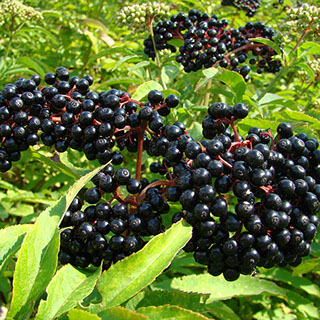
Red elderberries are found in China, Blue elderberries in the Rocky Mountains, and Black elderberries (sambucus nigra) through out Europe and the Americas. Black elderberries are a dark purple berry that has many naturally occurring nutritional substances: Anthocyanins, Quercetin, Rutin, Polyphenols, Omega-3 and Omega-6 fatty acids and are naturally low in sugar. Elderberry products are often named Sambucus because the Latin Genus name for elderberry is Sambucus Nigra.
Elderberries’ Centuries Old History!
Elderberries have been a companion to Man since the Stone Age and grow wild in the temperate zones around the world. Red elderberries are found in China, Blue elderberries in the Rocky Mountains, and Black elderberries (sambucus nigra) through out Europe and the Americas. Black elderberries are a dark purple berry that has many naturally occurring nutritional substances: Anthocyanins, Quercetin, Rutin, Polyphenols, Omega-3 and Omega-6 fatty acids and are naturally low in sugar. Elderberry products are often named Sambucus because the Latin Genus name for elderberry is Sambucus Nigra.
Elderberries’ relatively thin skin makes long term storage as fruit very difficult, unlike citrus fruit. They are prepared for long term storage by one of three methods: Extracts (fruit processed with chemicals, especially alcohol, to “extract parts of the elderberry”), Powders (by drying and crushing the elderberries), and Liquid Concentrate (juice concentrates are produced by removing water from the natural juice to concentrate the fruit solids by vacuum distillation under 145° Fahrenheit).
Most elderberry products are:
- capsules or tablets of dried elderberry powder
- liquid mixtures of extracts or dried powder and alcohol, sugar, or other sweeteners
- concentrate made by mixing other juice concentrates with elderberry products.
This wide variety of forms and strengths of the extracts used makes comparisons between products extremely difficult and confusing. Most products have a suggested daily amount and you do not want to go over this to avoid stomach upset. It is also important to remember that the bark,and leaves of the plant are also known to be poisonous and to many raw elderberries may cause stomach problems and not recommended for pregnant women.
Pros: Elderberries are a low calorie food packed with antioxidants. They are high in Vitamin C and dietary fiber. They are a good source of phenolic acids and flavonols. Studies have shown elderberry juice may reduce the level of fat in the blood and decrease cholesterol. Elderberry has been found to inhibit the growth of bacteria like Helicobacter pylori and may improve symptoms of sinusitis and bronchitis. They may also have anti-inflammatory effects, while improving cold and flu symptoms. Both European and American elder have been found to have some cancer-inhibiting properties in test-tube studies
Cons: Stomach upset when the bark, unripe berries, and seeds are eaten because they contain small amounts of substances known as lectins. In addition, the elderberry plant contains substances called cyanogenic glycosides, which can release cyanide in some circumstances. This is a toxin also found in apricot seeds and almonds. Fresh Elderberry is not recommended for children and adolescents under 18 years old, or pregnant or lactating women. While no negative events have been reported in these groups, there is not enough data to confirm that it is safe. Symptoms of eating uncooked berries, leaves, bark, or roots of the elderberry include nausea, vomiting, and diarrhea.
-s- – – – – – – –
Elderberry Syrup Recipe
- 2 ounces of elderberry concentrate
- 4 ounces of spring water
- 1.5 cups of Sugar or Ninja Honey Bee Honey (use honey if not serving to anyone under 2 yrs of age)
- .25 teaspoon of lemon juice
- Combine all in a jar, shake, and serve. Chill after opening.
- Makes about 12 ounces of syrup
Ninja Honey Bees LLC, is happy to announce that we have added Sambucus Elderberry Jelly to our product line.
